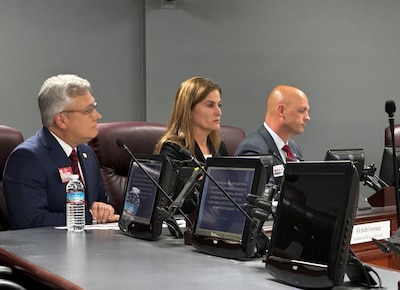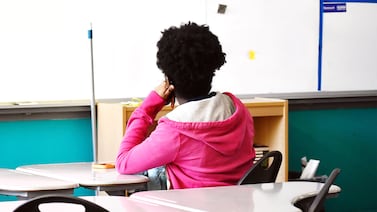Sign up for Chalkbeat Tennessee’s free daily newsletter to keep up with statewide education policy and Memphis-Shelby County Schools.
At the Halfway Market in Franklin, Tennessee, where locals come for a good hamburger and friendly conversation, Republican Brian Beathard works the crowd as a candidate for a high-profile legislative seat ahead of a pivotal session on the future of the state’s education system.
By most standards, Beathard should be a shoo-in to replace departing state Rep. Sam Whitson, a four-term Republican lawmaker who’s retiring this year.
Beathard (pronounced BETH-ard) has served on the Williamson County Commission since 2010 and, as its current chairman, has a record of advocating for government efficiency, competence, and conservatism in a predominantly Republican community.
He’s been endorsed by top local leaders, including Whitson, three mayors, and a retired sheriff.
And he’s the only one of three Republican candidates for the District 65 seat who has continuously lived and worked for more than 25 years in the affluent suburban county south of Nashville.
But when Republican Gov. Bill Lee handed out endorsements in key statehouse primary races last month, Beathard got bypassed because of his stance on a single issue: private school vouchers.
Lee is betting big on a policy in which he’s had major victories during his nearly six years in office, but has still fallen short of his ultimate goal: taxpayer funding for private school tuition for any Tennessee student who wants it — including those from middle-class and wealthy families — all under the banner of “school choice.”
The governor’s universal voucher proposal stalled in the legislature this spring, even with a GOP supermajority. Now, in anticipation of a do-over, Lee is taking the unusual step of using his bully pulpit to endorse certain Republican candidates over others.
A proponent of local control, Beathard — like Whitson — opposes the governor’s plan, especially for Williamson County, home to two of the state’s top-performing public school districts.
“Our schools are our oceanfront property, so we should take a hard pause on anything that could negatively affect our students, our schools, our property values, or our ability to attract business,” Beathard said of Williamson County, where such big companies as Nissan, Mitsubishi Motors, Mars Petcare, and Tractor Supply Co. have their U.S. headquarters.

The governor, who also is from Williamson County and graduated from a public high school in Franklin, instead is backing real estate investor and attorney Lee Reeves, who moved to Tennessee five years ago from Texas. Reeves, who serves on a local zoning appeals board, supports school vouchers, as does candidate Michelle Foreman, a former member of the state’s Republican executive committee.
Whoever wins the three-way Republican primary on Aug. 1 is likely to succeed Whitson.
And Lee is eager to replace voucher opponents like Whitson with supporters to achieve his top policy priority.
Governor is ‘taking a risk’ by wading into contested primaries
After his universal voucher proposal collapsed in committees over Republican disagreements about the specifics, the governor pledged to vet GOP legislative candidates this election year based on his school choice agenda.
“I’ve said a lot of times I get engaged in elections, and I get engaged in candidates,” he told reporters in May, promising to “understand who I can be most supportive and most helpful to.”
He’s following the playbook of Iowa Gov. Kim Reynolds and Texas Gov. Greg Abbott, who successfully used school choice as a litmus test to remove anti-voucher Republican candidates from races, enabling Iowa to pass universal vouchers in 2023 and positioning Texas for a potentially similar outcome next year.
“The governor already put his reputation on the line to get vouchers through this spring and it didn’t work, so now he’s playing hardball. But he’s also taking a risk.”
— John Geer, political science professor, Vanderbilt University
But if Lee’s endorsees lose their primary races to candidates like Beathard, the governor may find it even harder to push his education agenda through the legislature in 2025 as he enters his last two years in office, accelerating his lame duck status.
“The governor already put his reputation on the line to get vouchers through this spring and it didn’t work, so now he’s playing hardball,” said John Geer, a political science professor at Vanderbilt University.
“But he’s also taking a risk,” Geer continued. “If some of these candidates who didn’t get his endorsement survive, they’ll be even more entrenched” against vouchers.
According to Beathard, Lee and members of his staff didn’t speak personally with him about his position before announcing which candidates he was backing.
A small-business owner who supported Lee’s campaign for governor, Beathard is not completely opposed to vouchers, but wants local officials to be able to make the final call — a deference that wasn’t part of Lee’s 2019 education savings account law that imposed vouchers on Memphis and Nashville over the opposition of most local officials.
“My ears are open if there were a local option so Williamson County can opt out and counties that need that policy can opt in,” Beathard said.

Pro-voucher interests have the governor’s ear
Lee’s endorsements in his home county, as well as a handful of other state legislative races, generally mirror those announced earlier by Americans for Prosperity, a pro-voucher group affiliated with Kansas billionaire Charles Koch’s conservative advocacy network.
“We plan to put the full weight of our grassroots efforts behind each of our policy champions,” said Tori Venable, the group’s Tennessee leader, when rolling out several slates of endorsements in May.
A large amount of money is also coming into the state from pro-voucher interests.
The American Federation for Children launched a Super PAC for the 2024 elections cycle with at least $10 million to support pro-voucher candidates in state legislative races nationwide.
“If you’re a candidate or lawmaker who opposes school choice and freedom in education, you’re a target. If you’re a champion for parents, we’ll be your shield,” said Tommy Schultz, the group’s national CEO and its former spokesperson in Tennessee.
That’s just one of the concerns of Whitson, the departing state representative.
“The governor’s endorsement in District 65 opens the door for dark money from out of state to get into this campaign, simply so our governor can try to secure one more vote for his voucher program,” Whitson said.
Another voucher vote likely would be close in Tennessee’s House
Lee, who cruised to victory in two elections after campaigning to give parents more education choices for their children, appeared to have enough Senate votes to pass a statewide voucher plan this year, but couldn’t rally the House’s GOP supermajority to do the same.
His 2019 proposal to create a voucher program for Tennessee’s two biggest urban areas squeaked through the legislature after then-House Speaker Glen Casada held the voting board open for 38 minutes to convince Rep. Jason Zachary, of Knoxville, to change from “no” to “yes.” That controversial parliamentary maneuver remains a source of bitterness on both sides of the aisle, according to Whitson.
“There’s still a lot of fallout from that vote,” Whitson said. “But ethically and morally, I consider my ‘no’ vote on that day to be the best vote I ever cast.”
Supporters say universal vouchers would put all Tennessee parents in charge of their children’s education by making private schools a more affordable option.
Critics like Whitson say the policy would destabilize public education, bust the state’s budget, and further segregate schools by race, income, and students with disabilities, setting the stage for discrimination lawsuits against the state and various participating private schools.
“A lot of Republicans feel like the governor is putting us in a bad position with his voucher plan,” Whitson said. “And many are also disappointed at his tactic of injecting himself in the primary races.”

Scott Golden, who chairs the state Republican Party, said Lee has been talking about his passion for school choice since he first ran for governor eight years ago. Lee also has a right, he said, to campaign for issues that are important to him.
“We see it all the time on the national level. Elected officials are free to make their voices heard during an election cycle, just like anybody else,” Golden said.
Hendrell Remus, who chairs the Tennessee Democratic Party, has a different take.
“The governor is willing to tear his Republican caucus to shreds in order to pass one item on his agenda,” Remus said. “But I think voters will step up and reject the candidates who Gov. Lee is trying to prop up. It’s an opportunity for Democrats.”
It’s unclear how the governor’s endorsements will play out this election year. Results of voter polls on vouchers vary wildly in Tennessee.
But for Lucetta Mannion, a Republican voter in Williamson County, Lee’s backing of a pro-voucher candidate helped to bring the issue to her attention — and steered her toward Beathard’s camp.
“I’ve done my research,” said Mannion, whose five grandchildren have attended local public schools. “Our schools are excellent, and I see no reason to have a voucher system for our children. If Brian wins, it will be one more vote in the legislature against it.”
Marta Aldrich is a senior correspondent and covers the statehouse for Chalkbeat Tennessee. Contact her at maldrich@chalkbeat.org.







